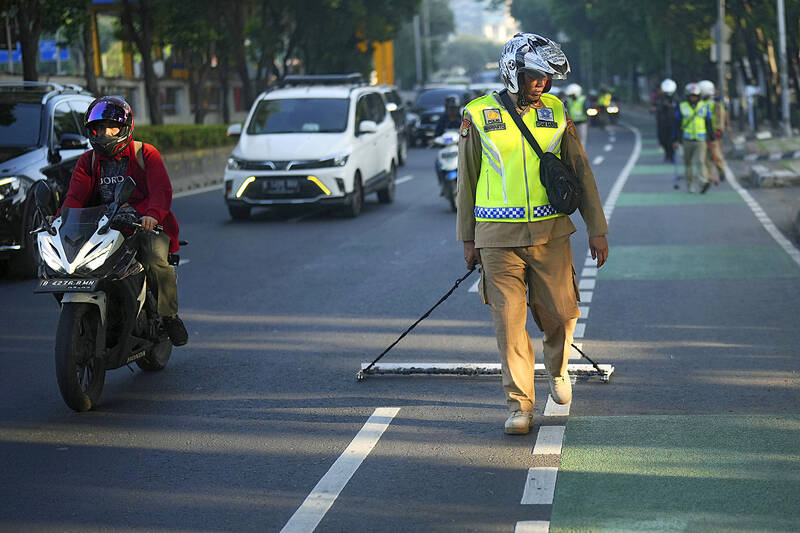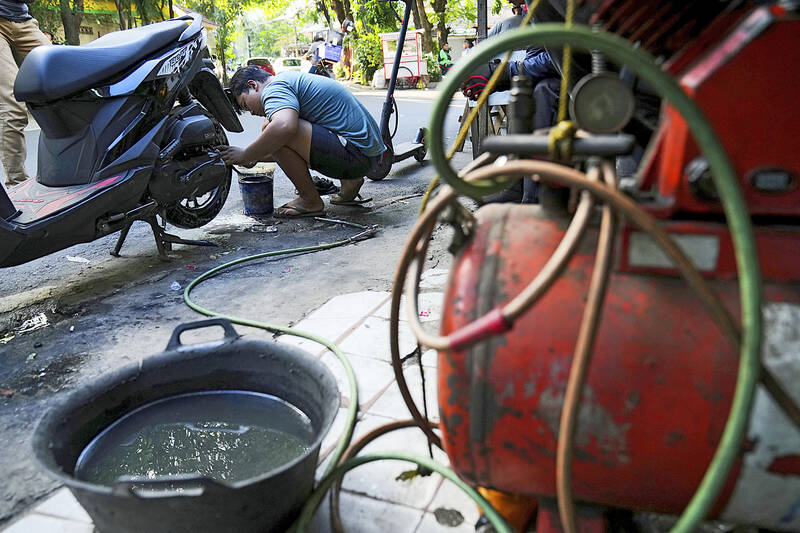Clad in reflective vests and waving traffic control sticks, a spirited crew on a main road in central Jakarta cheerfully waved to people as they cleared hidden hazards with iron bars and circle magnets tied to ropes.
The volunteer team covered 0.5km and scooped up a haul of sharp metal including nails, threaded bolts and scraps of umbrella frames during what they considered a good Saturday morning’s work making the streets of Indonesia’s capital safer from “nail traps.”
Jakarta’s main roads are notorious for the patches of sharp metal pieces that are believed to be spread by vandals intent on damaging the tires of vehicles, usually on main roads where traffic moves fast.

Photo: AP
Siswanto, a resident of West Jakarta, began collecting metal from the streets in 2010. Inspired by his efforts and fueled by their own bad experiences with the pesky tire traps, more Jakarta road users joined in. The effort soon grew into a community known as the Sapu Bersih, also known as the Clean Sweep or Saber community.
“From 2010 to 2016, we collected 4 tonnes of the nail traps from Jakarta and other areas, like Bekasi. We collected them from the volunteers,” said Siswanto, now 51, who used a rope tied to a magnet to collect sharp pieces as he patrolled a roadside with a fellow volunteer.
After 15 years, the community members are still trying to clean the streets. They take turns before they go to their workplaces in the morning or before returning home in the evening.

At least 250g of metal pieces are collected every morning from several locations, Siswanto said.
Jakarta Traffic Police Chief Komarudin lauded the efforts of the street sweepers who are trying to reduce the traps.
“In addition to identifying the purpose and combing the locations, the communities, such as Saber, has also volunteered to clean the roads, which deserves our appreciation,” Komarudin said.
When bikers hit the patches of accumulated metal pieces, tires deflate relatively quickly.
“The nail trap is harmful. It particularly can damage tubeless tires. If it’s a small hole that can still be patched. If it’s a big one, it has to be replaced if not given another inner tube,” said Yoga Fajri Pratama, who does repairs.
Although his shop is not close to some of the usual nail trap locations, Pratama said many bikers come to him to have tires fixed.
A trap does not have to be a nail, but could also be a piece of iron with a hole in the middle, like an umbrella frame cut into small pieces, he said.
Many believe the nail traps do not accumulate accidentally. There is a suspicion that troublemakers deliberately spread the tire-shredding hazards, with motorbikes a prime target.
“It is also sad to hear that someone is spreading them. That means they intentionally damage other people’s tires,” Pratama said.
According to one rumor circulating among Jakarta residents, nail traps could be connected to tire repair shops trying to create more business.
“It is suspicious after hitting a nail trap, 100 meters from where we hit there was a tire patcher. That is suspicious, but I am not accusing, no,” said Pandu Dewanata, a 29-year-old motorbike taxi driver who has had at least three tire punctures caused by metal fragments in the past year.
Police investigating the traps have found nuts or bolts that could accidentally fall from passing vehicles, but also nails and other objects that are deliberately bent.
Komarudin suspects the sharp debris also is intended to force bikers to the side of a road with a flat and turn them into easy targets for more serious crimes such as robbery.
Dian Anggraeni, 33, a taxi driver from Jakarta, joined the Clean Sweep community in 2018 when she was working as a motorbike driver.
Her experience of having flat tires up to three times a day, or several days in a row, prompted her to seek a way to prevent possible accidents or repair costs caused by nail traps.
Years later, she continues to feel the urge to remove the dangerous objects that keep coming back.
“When I finished sweeping nails on the road, I felt that it is enough, I had enough, and can minimize the casualties. Even after I finished it, I can find more in five or 10 minutes later,” Anggraeni said. “It’s a bit annoying, too, so I want this to end. It seems like it’s already over, no nail trap, but they are moving locations again. That’s what makes us never finish.”

The team behind the long-awaited Vera Rubin Observatory in Chile yesterday published their first images, revealing breathtaking views of star-forming regions as well as distant galaxies. More than two decades in the making, the giant US-funded telescope sits perched at the summit of Cerro Pachon in central Chile, where dark skies and dry air provide ideal conditions for observing the cosmos. One of the debut images is a composite of 678 exposures taken over just seven hours, capturing the Trifid Nebula and the Lagoon Nebula — both several thousand light-years from Earth — glowing in vivid pinks against orange-red backdrops. The new image

Canada and the EU on Monday signed a defense and security pact as the transatlantic partners seek to better confront Russia, with worries over Washington’s reliability under US President Donald Trump. The deal was announced after a summit in Brussels between Canadian Prime Minister Mark Carney and European Commission President Ursula von der Leyen and European Council President Antonio Costa. “While NATO remains the cornerstone of our collective defense, this partnership will allow us to strengthen our preparedness ... to invest more and to invest smarter,” Costa told a news conference. “It opens new opportunities for companies on both sides of the

ESPIONAGE: The British government’s decision on the proposed embassy hinges on the security of underground data cables, a former diplomat has said A US intervention over China’s proposed new embassy in London has thrown a potential resolution “up in the air,” campaigners have said, amid concerns over the site’s proximity to a sensitive hub of critical communication cables. The furor over a new “super-embassy” on the edge of London’s financial district was reignited last week when the White House said it was “deeply concerned” over potential Chinese access to “the sensitive communications of one of our closest allies.” The Dutch parliament has also raised concerns about Beijing’s ideal location of Royal Mint Court, on the edge of the City of London, which has so

With a monthly pension barely sufficient to buy 15 eggs or a small bag of rice, Cuba’s elderly people struggle to make ends meet in one of Latin America’s poorest and fastest-aging countries. As the communist island battles its deepest economic crisis in three decades, the state is finding it increasingly hard to care for about 2.4 million inhabitants — more than one-quarter of the population — aged 60 and older. Sixty is the age at which women — for men it is 65 — qualify for the state pension, which starts at 1,528 pesos per month. That is less than US$13